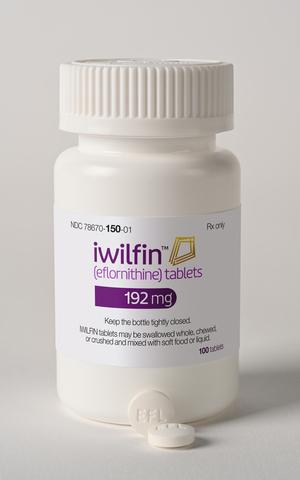Eflornithine Side Effects
Applies to eflornithine: oral tablet.
Important warnings
This medicine can cause some serious health issues
Use only as directed.
Tell your doctor if you use other medicines or have other medical conditions or allergies.
Get emergency medical help if you have signs of an allergic reaction: hives, difficult breathing, swelling of your face, lips, tongue, or throat.
Call your doctor at once if you have:
-
hearing problems such as ringing in your ears or hearing loss;
-
liver problems--loss of appetite, nausea, vomiting, stomach pain (upper right side), tiredness, itching, dark urine, clay-colored stools, jaundice (yellowing of the skin or eyes); or
-
low blood cell counts--fever, chills, tiredness, mouth sores, skin sores, easy bruising, unusual bleeding, pale skin, cold hands and feet, feeling light-headed or short of breath.
Your cancer treatments may change, be delayed, or permanently discontinued if you have certain side effects.
Common side effects may include:
-
fever, diarrhea, vomiting;
-
ear, sinus, or skin infections;
-
urinary infection (UTI);
-
cold or allergy symptoms such as cough, stuffy, runny, or itchy nose, sneezing, sore throat; or
-
red or swollen eyes (pinkeye).
This is not a complete list of side effects and others may occur. Call your doctor for medical advice about side effects.
See also:
For healthcare professionals
Applies to eflornithine: oral tablet.
General adverse events
The most frequently reported side effects included hearing loss, otitis media, pyrexia, pneumonia, and diarrhea.
The most frequently reported grade 3 or 4 laboratory abnormalities included decreased hemoglobin, decreased neutrophils, increased ALT, and increased AST.[Ref]
Dermatologic
Gastrointestinal
- Very common (10% or more): Diarrhea (15%), vomiting (11%)
- Frequency not reported: Colitis
Diarrhea included colitis.
Genitourinary
- Common (1% to 10%): Urinary tract infection
Hematologic
- Common (1% to 10%): Decreased hemoglobin, decreased neutrophils, decreased platelets, decreased white blood cells
- Frequency not reported: Myelosuppression
Hepatic
- Common (1% to 10%): Increased ALT, increased AST
- Frequency not reported: Hepatotoxicity
Metabolic
- Common (1% to 10%): Decreased glucose, decreased potassium, decreased sodium, increased alkaline phosphatase, increased potassium, increased glucose
Musculoskeletal
- Frequency not reported: Pain in extremity
Ocular
- Very common (10% or more): Conjunctivitis (11%)
Other
- Very common (10% or more): Otitis media (32%), pyrexia (11%)
- Common (1% to 10%): Hearing loss
Respiratory
- Very common (10% or more): Allergic rhinitis (11%), cough (15%), upper respiratory tract infection (11%), pneumonia (12%), sinusitis (13%)
References
1. (2023) "Product Information. Iwilfin (eflornithine)." US WorldMeds LLC
More about eflornithine
- Check interactions
- Compare alternatives
- Dosage information
- During pregnancy
- Drug class: miscellaneous antineoplastics
- Breastfeeding
- En español
Patient resources
Other brands
Professional resources
Other brands
Related treatment guides
Further information
Eflornithine side effects can vary depending on the individual. Always consult your healthcare provider to ensure the information displayed on this page applies to your personal circumstances.
Note: Medication side effects may be underreported. If you are experiencing side effects that are not listed, submit a report to the FDA by following this guide.

